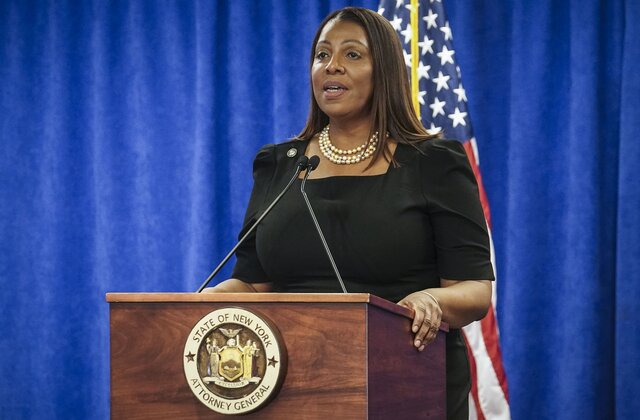The upstate golf course and estate of Trump could be the first properties seized in what could be a gradual disintegration of his corporate empire, as he faces a deadline of Monday to obtain a bond.
New York’s attorney general appears poised to seize the Trump National Golf Course and the former president’s estate in Westchester County if Donald Trump cannot secure a bond by Monday to cover the half-billion dollar judgment leveled against him for committing fraud.
The $454 million civil judgment was registered earlier this month in the suburban county north of New York City by New York state Attorney General Letitia James, according to the county clerk’s database. Although James is not certain to take possession of the properties, this move—which was initially reported by Bloomberg—is the first in a series of actions that would enable her to obtain liens on them.
If Trump fails to obtain a bond while he fights the ruling, those properties would become the first in a potentially protracted process of deconstructing his self-proclaimed billionaire’s economic empire. Trump has a deadline of this coming Monday.
State Attorney General Letitia James of New York registered the $454 million civil judgment early this month in the suburban county north of New York City, according to the county clerk’s database. This effort, originally reported by Bloomberg, is the first in a sequence of steps that would allow James to secure liens on the properties, even though it is not a given that she will gain control of them.
Those assets would be the first in a possibly lengthy process of dismantling Trump’s self-proclaimed billionaire’s economic empire if he is unable to secure a bond while he challenges the verdict. Trump has until this Monday to meet his deadline.
In February, Judge Arthur Engoron ordered Trump to pay $364 million in damages for fraud he committed by inflating his net worth to obtain favorable treatment from banks and insurers and barred him from participating in New York’s real estate industry or running any company in the state.
The daily interest on Trump’s debt is around $112,000 more. He currently owes $457 million. Including the losses of his two adult sons and additional co-defendants, the total damages exceed $467 million. Additionally, on March 25, the automatic 30-day stay of the Engoron ruling expires, after which James may start seizing Trump’s assets unless the appeals court intervenes or he is able to obtain a bond.
Securing a bond of this kind to pay the damages is a “practical impossibility,” according to a court filing earlier this week from Trump’s legal team.
They outlined attempts to seek appeal bonds at about 30 surety companies, including Chubb, one of the largest insurance companies in the world, but kept running up against policies that charge bond premiums and only accept cash as collateral – not real estate. And that required collateral, his lawyers added, is typically 120% of the judgment, or in this case $557 million.
This week, Trump has been criticizing the procedure—as well as the entire ruling—in a growing number of frantic social media tweets.
“Even though I did nothing wrong, Arthur Engoron—a true Trump hater and radical left New York judge—picked a number out of thin air (can we talk about his unconstitutional gag order?)” the man said on Thursday. “He wants me to bond it, which is not possible for bonding companies to do in such a high amount, before I can even appeal,” the man continued. That is absurd!
“The assets would be lost forever if I sold them and then prevailed in the appeal. Furthermore, it is VERY EXPENSIVE to put up money before an appeal, he stated. “He made a demand on us that he knows cannot be met.”
However, legal experts have quickly noted that Trump is not being treated any differently and that, if he has, it has only been for his benefit. This process is simply the justice system operating as it is meant to.


